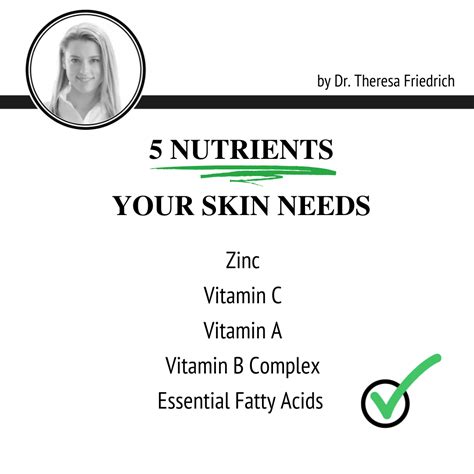5 Key Nutrients That Support Healthy Skin

Our skin, the largest organ in the body, acts as a protective barrier against environmental stressors, toxins, and harmful microbes. But maintaining its health and radiance goes beyond just topical treatments. The nutrients we consume play a pivotal role in nourishing the skin from the inside out. Whether you're looking to prevent early signs of aging, manage acne, or simply achieve a glowing complexion, understanding which nutrients support skin health is essential. Here are five key nutrients that are crucial for keeping your skin healthy and vibrant:
Vitamin C: The Powerhouse Antioxidant
Vitamin C is one of the most well-known and widely studied nutrients for skin health. As a powerful antioxidant, it helps protect the skin from oxidative stress caused by free radicals, which can damage skin cells and accelerate aging. It also plays a vital role in collagen synthesis, a protein that gives the skin its strength, structure, and elasticity.
Benefits for Skin:
- Promotes collagen production, which helps maintain skin's firmness and elasticity.
- Reduces the appearance of wrinkles and fine lines.
- Protects against UV damage and environmental pollutants.
- Helps brighten skin tone by inhibiting melanin production.
Food Sources:
- Citrus fruits (oranges, lemons, grapefruits)
- Bell peppers
- Strawberries
- Kiwi
- Broccoli
- Spinach
Vitamin E: The Skin's Defender
Vitamin E is another potent antioxidant that helps protect the skin from oxidative damage, particularly from UV rays and pollution. It also has anti-inflammatory properties that can help soothe irritated skin. Vitamin E is often found in many topical skincare products due to its moisturizing and skin-repairing benefits.
Benefits for Skin:
- Protects the skin from UV damage and environmental stress.
- Moisturizes and hydrates the skin.
- Reduces the appearance of scars and skin damage.
- Enhances skin healing and repair.
Food Sources:
- Almonds
- Sunflower seeds
- Spinach
- Avocados
- Wheat germ oil
Omega-3 Fatty Acids: Essential for Skin Hydration
Omega-3 fatty acids are essential fats that the body cannot produce on its own, meaning they must be obtained through diet. These fats are crucial for maintaining skin's natural moisture barrier, helping to keep it hydrated, plump, and healthy. Omega-3s also have anti-inflammatory properties, which can benefit individuals with inflammatory skin conditions like eczema, psoriasis, and acne.
Benefits for Skin:
- Helps maintain the skin's moisture barrier and prevents dryness.
- Reduces inflammation, which can benefit acne and other inflammatory skin conditions.
- Promotes a smoother, more even complexion.
- Supports skin's overall elasticity and suppleness.
Food Sources:
- Fatty fish (salmon, mackerel, sardines)
- Chia seeds
- Walnuts
- Flaxseeds
- Hemp seeds
Zinc: The Mineral for Clear Skin
Zinc is an essential mineral that plays a critical role in skin health. It helps regulate oil production, making it beneficial for those with oily or acne-prone skin. Zinc also has anti-inflammatory properties and promotes wound healing, making it valuable for addressing skin issues like acne, cuts, and scars.
Benefits for Skin:
- Helps regulate sebum (oil) production, reducing the likelihood of clogged pores.
- Reduces the severity of acne and other skin blemishes.
- Aids in wound healing and reduces scarring.
- Supports the skin’s immune function, helping to combat skin infections.
Food Sources:
- Oysters
- Pumpkin seeds
- Lentils
- Chickpeas
- Beef and lamb
- Spinach
Vitamin A (Retinol): The Skin Rejuvenator
Vitamin A is a crucial nutrient for skin health and is particularly important for maintaining a youthful appearance. It promotes cell turnover, meaning it helps your skin shed old, dead skin cells and produce new, fresh ones. This process is essential for preventing clogged pores, reducing acne breakouts, and keeping the skin smooth and even-toned. Vitamin A is also found in retinoids, a common ingredient in skincare products aimed at reducing wrinkles and fine lines.
Benefits for Skin:
- Encourages skin cell turnover and repair.
- Reduces the appearance of fine lines, wrinkles, and age spots.
- Helps with acne by preventing clogged pores and reducing inflammation.
- Promotes overall skin tone and texture.
Food Sources:
- Sweet potatoes
- Carrots
- Dark leafy greens (kale, spinach)
- Egg yolks
- Liver
Final Thoughts
While topical skincare products can certainly enhance the appearance of your skin, what you put into your body is just as important, if not more so. A well-balanced diet rich in these key nutrients—Vitamin C, Vitamin E, Omega-3 fatty acids, Zinc, and Vitamin A—can provide the foundation for healthy, glowing skin. By focusing on nutrient-dense foods and adopting a skin-friendly diet, you’re nourishing your skin from the inside out, helping it to look and feel its best at every stage of life.